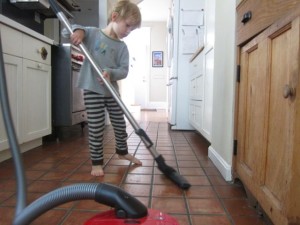
‘Tis the season of chore-time slackerdom.
School is starting again, practice for fall sports is in full swing, and, inevitably, it’s simply no longer possible for children of any age to empty the dishwasher or take out the garbage. There, like, just isn’t enough time, and what parent has the time to police them anyway?
So here’s a motivational solution from Julie Clarke, a mother of two in San Jose, Calif.: Pay for performance. In her house, she and her husband hand out $40 a month to each of their two daughters when they do an adequate job. But Katherine, who is 12, and Lauren, 8, can earn $60 each if they exceed expectations or they can receive $20 or even nothing at all if there’s a lot of reminding and whining along the way.
I have never been a fan of paying kids to do chores. To me, chores are something that everyone in the household should do in exchange for getting to live there. If the parents don’t get paid, then the children shouldn’t either. Allowance is something altogether separate to my mind — a way to teach kids how to use money.
Polls of American parents have repeatedly shown that the vast majority of mothers and fathers don’t see it this way. Which is all well and good until the kids decide they don’t need any more money, and the parents have to decide whether to excuse them from all the chores they then refuse to do.
But this hasn’t happened in the Clarke household yet. If you don’t think it would happen in yours, given the amount of stuff your kids will want to buy over time and the list of things you make them pay for themselves, then the Clarke compensation system is worth testing in your home.
Here’s how it works:
First, the list of chores: Make the bed, get the breakfast dishes in the dishwasher and be ready for school on time. In the afternoon, empty the lunchboxes, refill the water bottles and walk, feed and clean up after the family’s Maltese-poodle mix. (Mom and Dad spare the girls the task of deer and wild turkey excrement removal.) Other duties include emptying the dishwasher, helping with dinner, folding and putting away laundry, and practicing piano. The girls split walking and cleaning duties for the dog, and at dinner one tends to help with prep and the other with cleaning.
Ms. Clarke and her husband came up with the system for two reasons. “I don’t have the time, patience or capacity to manage every single thing they do,” she said. “I was never the mommy with a sticker chart for peeing in the potty or the one who gave points for doing chores. I wanted a holistic approach to the month.”
She also had distinct memories of the first time an employer evaluated her. “It’s a hard lesson to learn when you go into the work force. `What do you mean I’m not getting a great bonus?!’ ” she said. “I want them to learn this earlier rather than later.”
The biggest evaluative factor is attitude, especially given that Katherine is on her way to becoming a teenager. The need for nagging, or lack thereof, is high on the list as well. Being proactive wins special notice too, like when Lauren picked up the slack when Katherine had surgery. It was nice of her, though perhaps it wasn’t entirely selfless. “She was totally working it,” Ms. Clarke recalled, laughing.
The girls get feedback throughout the month, as needed. Eye-rolling, drama or the need for frequent reminders will lead to a verbal warning that the payout is trending downward. The results tend to be evenly spaced too, with the pair earning $40 each about half the time and getting the bonus or the lowest amount 25 percent of the time each. They don’t always get the same amount, and occasionally they get nothing if the month has been particularly rough. Their father, Gary, a true-to-form geometry teacher, wonders if a mapping diagram for proper chore completion might improve their success rate.
So far, the family’s approach has not proven enormously popular beyond its own walls. Ms. Clarke, who works in marketing for a technology company, mentioned it at a parenting workshop once, and the people in the room didn’t quite take to it. Some of them said that it could never work for them, since their kids simply won’t do their chores unless a parent is hovering and constantly reminding them, bonuses or not.
Others didn’t like the idea of posting chore scores as if they were ice-skating judges. “I remember one mother who said she could never do it, and I know her two boys, and I can tell that one is going to be a lawyer and one is going to be in sales,” Ms. Clarke said. “I would start them right now based on those personalities. They’ve already learned how to work their mom so well.”
Some parents may question the size of the Clarke kids’ allowance, given that it amounts to nearly $15 a week during high-performance months. But the Clarke adults budget only for the after-school and summer activities they can afford and require the girls to spring for the rest. Katherine, for instance, pays for half a week at overnight camp.
Lauren, who’s a gymnast, recently split the cost of a used mat with her parents, drawing from the $1,200 she had saved. And if she wants to take extra lessons aside from the one per week that her parents pay for, it’s on her. “It’s going to be about $100 per month, which she can afford, so she has to decide whether she really wants to do it,” Julie said. “I think it’s a pretty good question for an 8-year-old to have to answer.”